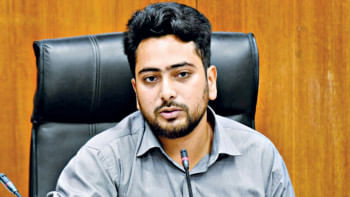The challenges the film certification board faces

Bangladesh is in the process of changing. Some call it progress, some term it disrespecting the past, while many seem to be showing the courage to face challenges that are common during transitions—painful, yet necessary. Changes are hard for sure, and one might admit that it is easier for things to remain as they have for centuries, for life to go on as it does in Bruegel's Landscape with the Fall of Icarus. It was, however, the Irish playwright and critic George Bernard Shaw who said that "progress is impossible without change, and those who cannot change their minds cannot change anything."
Ever since September 22, 2024, when the Bangladesh Film Censor Board was dissolved and the Bangladesh Film Certification Board was established, filmmakers and creators alike have been waiting for a positive change. As seen during major transitions all over the world, organisations go through re-shelving operations—to archive, discard and eventually introduce new ideas. Similarly, the new film certification board has been trying to do the same: pave new avenues, update policies, and learn more, in the process, about the survival techniques of the Bangladeshi film industry. But most importantly, the new committee is also trying to figure out ways to release the films that have been gathering dust for several years.
The basic difference between a censor board for films and a certification board is that of creating limits where content is concerned. "While one has the power to restrict the showcasing of movies according to the censorship act of 1963, the other analyses the content, and certifies releases for appropriate audiences based on age," says Rafiqul Anowar Russell, a filmmaker, an educator and also member of the current board. According to the rules or bidhimala created in 1977 and 1985 based on the act, the censor board had the power to either restrict a film or let it go with a clearance certificate.
The Censorship of Films Act, 1963, composed of board members designated by the government, would examine, review and certify films for public screening, adds Russell. According to Section 3 of the 1963 act, the board could basically determine if a film was viewable or right for the general audience or not. "In a nutshell, it was either yes or no from the board—if a film would be allowed to run or not," adds Russell.
In 2023, the government decided to amend the act, calling it the Bangladesh Chalachitra Certification Act, 2023. The newly formed film certification board focuses more on a "rating system" where films are rated and made available for age-appropriate audiences. This system is followed in countries like the US, UK and also in India. "Some of the most successful and biggest industries have been following the certification system for films for years," says Russell.
"Films do get pulled out even under the certification system, and this has happened in many developed industries as well," he adds. In rare cases, certain films were pulled out or not allowed to be released due to extreme levels of violence or nudity or even attacks on certain communities and minorities. However, according to Russell, while a censor board would restrict the release of at least 50-60 percent of films due to the existing rules related to the 1963 act, the certification system would still allow at least 90 percent of the films or more to be released, as long as they are tagged with the right age references.
Going back to the 1963 censorship act, two sets of rules or bidhimala were formed: the first one in 1977, and then the second in 1985, an elaboration of the previous set. Even though the act is not in existence anymore, the bidhilmala are, which include clauses, based on which a film can be restricted or cleared in terms of vulgarity, violence, nudity, obscenity, controversial topics, sensitive issues, etc showcased on screen.
Filmmaker and actor Khijir Hayat Khan says that there is a difference in mentality between the censor and the certification board in terms of philosophy and thought process. "There are these existing laws that we still have to abide by," referring to the rules from 1977 and 1985. "But it is definitely the mentality. We ask ourselves the questions: how and where do we want to see Bangladeshi films in the future? How much freedom do Bangladeshi filmmakers actually enjoy? And so much more. But there are some bigger issues that we have to overcome, which is forming the bidhimala or rules explaining the 2023 certification act. We are still following the explanations provided to us in 1977 and 1985. As per the constitution, if a set of rules does not exist, the law or act in question cannot be executed. Hence, we are actually stuck in between the old rules, filled with flaws, and a new act, which does not have any set of rules."
As seen during major transitions all over the world, organisations go through re-shelving operations—to archive, discard and eventually introduce new ideas. Similarly, the new film certification board has been trying to do the same: pave new avenues, update policies, and learn more, in the process, about the survival techniques of the Bangladeshi film industry. But most importantly, the new committee is also trying to figure out ways to release the films that have been gathering dust for several years.
Russell talks of several challenges that the current board faces. Starting from getting access to the films that were restricted by the previous regime or pending decisions from the High Court to creating a new law for the benefit of the filmmakers, the tasks at hand for the current board are turning out to be all the more strenuous and demanding than expected. "A major challenge for us is how to work around these rules and start the process of releasing films for age-appropriate audiences, the way we had always wanted to do," adds Russell. "Because the new act is still under construction, we have no choice but to follow the rules from 1977 and 1985 when it comes to reviewing films. Currently, we are also studying film certification acts and regulations of the more developed industries around the world and trying to implement them within our system."
There is also the issue of trying to secure access to the films which were restricted or "banned" for some reason or another by the previous regime. Quazi Nawshaba Ahmed, actor, theatre director, puppeteer and also one of the committee members of the certification board, says that the evidence of certain films being "officially banned" during the past regime is missing. "Of course, there were observations," she says. "The current certification board is taking the necessary steps to ensure that films don't stay in a 'hold' status. Only a few films are currently with the 'appeal' division, and those fall outside the scope of the board's work."
"We still do not have access to these films," says Russell. "It is necessary to review them so that the actual reason behind the restrictions could be understood. That would help the current board take proper steps to move forward as well."
The complications do not end there. For instance, Nawshaba says, "Production houses must clear all payments due to technicians and actors before the film is submitted for certification. A clearance certificate from the relevant industry association should be a mandatory document during the certification process, ensuring transparency and fairness in the payment of all professionals involved." She also emphasises animal welfare in films so that if animals are used in a film, it must be ensured that no harm is inflicted on them. "The certification board must have the authority to take legal action against those responsible if an animal's health is compromised due to the shoot. Scenes involving animal cruelty should be simulated through animation or VFX to prevent real harm," she adds. Nawshaba also mentions including strict criteria to address the logical and illogical use of tobacco and alcohol on screen and speaks about how the certification board should consist of a diverse panel of members representing different sections of society.
Clearly, hopeful outcomes from the new establishment will take months or years of work, research and the final formation of the act and its accompanying set of regulations. One can either choose to be fearful of the many challenges and obstacles that are springing up like mushrooms, or simply embrace these changes to create a better Bangladesh for the future, as intended. After all, as Leo Tolstoy writes, "True life is lived when tiny changes occur."
Elita Karim is a singer and journalist.
Views expressed in this article are the authors' own.
Follow The Daily Star Opinion on Facebook for the latest opinions, commentaries and analyses by experts and professionals. To contribute your article or letter to The Daily Star Opinion, see our guidelines for submission.

 For all latest news, follow The Daily Star's Google News channel.
For all latest news, follow The Daily Star's Google News channel. 











Comments